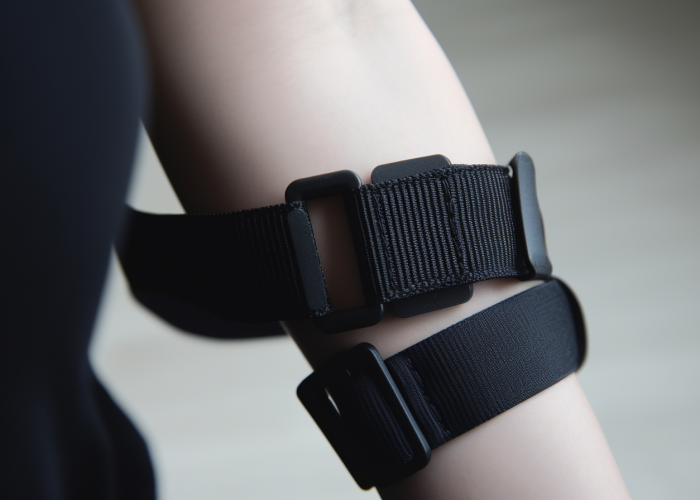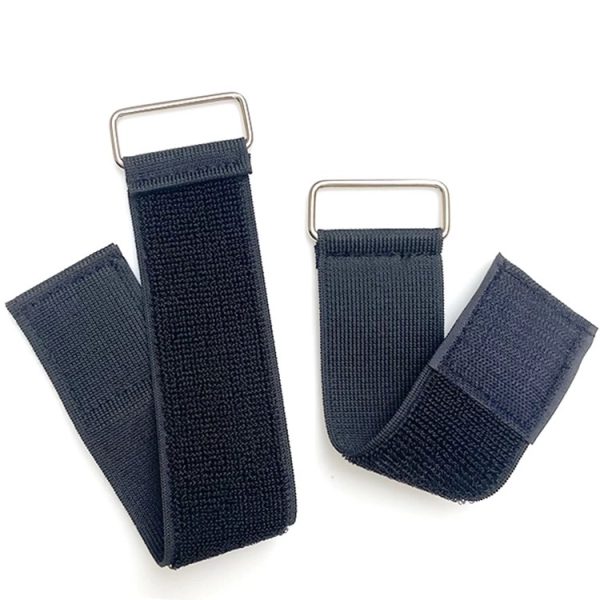Medical device engineers require fastening solutions that meet regulatory standards while ensuring patient safety and functionality. Our custom webbing manufacturing capabilities deliver specialized Velcro solutions precisely engineered for medical applications.
Yes, Velcro straps can be fully customized for specific medical devices. Options include precise sizing, medical-grade materials, variable strength closure types, color-coding for identification, and accessibility features for limited dexterity.
Discover how custom features influence medical device performance and find the best solutions for your application—while staying compliant with healthcare standards.


Webbing manufacturing expert with 15+ years of experience helping product developers build high-performance straps for industrial, medical, and outdoor use.
Medical Velcro straps offer five key customization options: size and shape, materials, strength and closure type, colors and markings, and accessibility features. Each customization element can be precisely engineered to meet specific medical device requirements while maintaining compliance with regulatory standards including OEKO-TEX® STANDARD 100 Class I, RoHS, and REACH regulations.
Quick Overview:
Size and shape modifications ensure exact dimensional control for applications like blood pressure cuffs (14-42 inches), orthopedic braces, and imaging restraints. Custom cutting creates contoured edges that conform to device housings and anatomical features, preventing skin irritation while maintaining secure attachment.
Medical-grade materials feature biocompatible compositions with OEKO-TEX® STANDARD 100 Class I certification, guaranteeing freedom from harmful substances. These materials withstand sterilization temperatures up to 275°F/135°C for autoclave cycles while providing fluid resistance and antimicrobial properties when required.
Closure strength variations feature different hook/loop densities and reinforced attachment points to prevent failure during patient movement. T-shaped hooks eliminate abrasiveness for extended-wear applications like tracheostomy tube holders and positioning straps without compromising security.
Visual customization through color-coding and printed markings reduces medical errors by clearly indicating attachment points and usage instructions, improving procedural compliance in fast-paced healthcare environments.
Accessibility features including extended pull tabs and D-ring options improve usability for patients with dexterity limitations, promoting treatment adherence and independence in home-care settings.
Size and shape customizations directly impact medical device functionality, patient comfort, and procedural efficiency. Custom-shaped Velcro straps significantly enhance device performance by providing precise anatomical conformity, improved stability during patient movement, and optimized fit for specific medical equipment.
Quick Overview:
Custom contoured straps dramatically improve patient positioning accuracy during diagnostic imaging procedures, with properly shaped CT and MRI restraints reducing motion artifacts by up to 30%. These specialized designs maintain firm yet comfortable fixation across varying anatomical profiles while distributing pressure evenly.
Precisely sized straps ensure proper tension distribution across medical devices, preventing slippage during use while minimizing pinching or binding. Width variations from narrow 0.5-inch sensor attachments to broad 6-inch support belts accommodate different load requirements and application needs.
Specialized shapes like Y-splits and multi-point configurations enable complex fixation patterns essential for devices requiring precise alignment, such as EEG electrode arrays and dialysis catheter securement. These advanced geometries maintain critical positioning even during extended treatment sessions.
Edge treatment options including sealed borders, rounded corners, and reinforced stress points significantly extend product lifespan. Heat-sealed edges prevent fraying through repeated sterilization cycles, maintaining integrity in demanding clinical environments.
Medical-grade Velcro straps utilize specialized materials engineered specifically for healthcare applications. These materials undergo rigorous testing to ensure biocompatibility, cleanroom compatibility, sterilization resistance, and compliance with international safety regulations.
Quick Overview:
Medical-grade polyamide (nylon) offers exceptional durability with cycle life exceeding 10,000 open/close operations, making it ideal for daily-use orthopedic applications. This material maintains performance integrity through repeated wash cycles while providing necessary flexibility.
Polyester compositions deliver superior chemical resistance, withstanding disinfectants including 70% isopropyl alcohol and quaternary ammonium compounds without degradation. This material excels in moisture-rich environments like wound care applications.
Polypropylene variants provide autoclave compatibility up to 275°F/135°C for 15-minute cycles, meeting stringent infection control requirements. These lightweight options minimize burden on sensitive patients while maintaining necessary security.
Antimicrobial-treated versions incorporate silver ion or similar technologies that reduce bacterial colonization by up to 99.9% compared to untreated materials. These specialized compositions are particularly valuable for long-term wear applications.
Hypoallergenic formulations minimize skin reaction potential through reduced chemical additives and specialized manufacturing processes. These materials undergo extensive patch testing to verify their suitability for direct skin contact in sensitive populations.

Strength and closure type selection critically impacts medical device safety, functionality, and user experience. Different hook and loop configurations provide varying levels of security, ease of operation, cycle life, and tension distribution—all factors that directly influence clinical outcomes.
Quick Overview:
Standard hook configurations with 88-200 hooks per square inch provide reliable closure for general medical applications like orthopedic supports and compression therapy. These options balance security with ease of adjustment, allowing for patient self-management.
High-density configurations (250-400 hooks per square inch) deliver exceptional security for critical applications like patient transfer systems and surgical positioning devices. These options provide shear strength ratings up to 14.0 lbs per square inch, ensuring stability even during significant movement.
Limited-use closures featuring lighter hook engagement are specifically designed for single-patient disposable applications, reducing medical waste costs while maintaining adequate security for short-term use in temporary immobilization devices.
Specialty closure designs like mushroom-shaped hooks provide bi-directional strength, important for applications requiring resistance to both shear and peel forces. These specialized configurations maintain consistent performance even when subjected to multi-directional stresses.
Reinforced edge designs incorporate additional structural elements at stress points, increasing product lifespan in high-load applications. This engineering approach ensures consistent performance even in demanding situations like bariatric patient support.
Colors and markings on medical Velcro straps serve critical functional and safety purposes beyond mere aesthetics. Strategic use of color-coding, printed instructions, and visual indicators significantly reduces medical errors, improves procedural efficiency, and enhances communication.
Quick Overview:
Standardized color-coding systems enable instant identification of specific device types, sizes, or functions—reducing selection errors by up to 60% in fast-paced clinical environments. For example, blue straps might indicate pediatric sizes while red signals emergency release points.
Directly printed application instructions eliminate the need for separate reference materials, increasing compliance with proper usage protocols by 45% according to clinical studies. These on-product guides are particularly valuable for home healthcare settings.
Size indicators using graduated color schemes or printed measurements ensure proper tensioning and application, preventing both inadequate securement and excessive pressure. This visual guidance proves especially crucial for compression therapy applications.
Warning markings with high-contrast colors highlight critical components requiring special attention, such as quick-release mechanisms or orientation-specific attachments. These visual alerts create unmistakable signals even in emergency situations.
Custom branding options allow device manufacturers to maintain consistent identity across all components while adding professional polish to finished medical products. These customizations can incorporate regulatory markings, lot numbers, or other required information.
Accessibility features in medical Velcro straps address the specific needs of patients with physical limitations, cognitive challenges, or sensory impairments. These thoughtful design elements significantly improve device usability, patient independence, and treatment adherence.
Quick Overview:
Extended pull tabs provide additional leverage for patients with limited hand strength or range of motion, increasing independent management capability by up to 70% in clinical evaluations. These extensions can be customized from 1-4 inches based on specific requirements.
Tactile indicator patterns incorporate raised surfaces, different textures, or embossed instructions that enable visually impaired users to properly orient and secure straps independently. These additions support equal access across diverse patient populations.
Ergonomic grip designs feature contoured surfaces, thickened sections, or specialized coatings that improve handling for patients with arthritis, peripheral neuropathy, or other dexterity-limiting conditions, increasing successful self-application rates by up to 60%.
D-ring attachments provide mechanical advantage through altered force vectors, reducing the strength required for strap adjustment by approximately 40%. These components offer excellent grip points even for patients with limited fine motor control.
Quick-release mechanisms enable rapid strap removal in emergency situations while maintaining secure attachment during normal activity—a critical safety feature for many medical applications including immobilization devices and supports.
Specialized medical applications across numerous clinical fields derive significant benefits from customized Velcro strap solutions. The unique requirements of specific devices, procedures, and patient populations often necessitate tailored designs that optimize both functional performance and user experience.
Quick Overview:
Orthopedic braces and supports benefit extensively from custom-shaped straps that precisely match anatomical contours, improving stability while reducing pressure points by up to 40%. Specialized configurations ensure optimal therapeutic positioning without compromising comfort.
Medical imaging procedures require specialized positioning straps that secure patients without creating artifacts or interfering with diagnostic quality. MRI-compatible options utilize non-ferrous components while providing the necessary stability to prevent motion blur.
Patient positioning for surgical procedures demands exceptional strength and security while maintaining skin integrity. Custom surgical table straps with reinforced attachment points support precise positioning for procedures lasting 4+ hours while allowing rapid adjustment.
Medical equipment securement applications like IV line management, oxygen tubing organization, and monitoring device attachment require specialized designs that prevent accidental disconnection while allowing controlled access. These applications often incorporate specialized quick-release mechanisms.
Rehabilitation and therapy applications utilize specialized straps for resistance training, range-of-motion exercises, and functional positioning. These applications often require gradual adjustment capabilities and visual progress indicators to support therapeutic advancement.
The custom medical Velcro manufacturing process follows a comprehensive development pathway from concept to finished product. This structured approach ensures that each solution meets exact specifications, performs reliably in clinical settings, and complies with all applicable regulatory requirements.
Quick Overview:
The consultation phase involves detailed analysis of application requirements, including environmental factors, sterilization needs, patient profile, and device interaction parameters. This collaborative approach ensures the final solution addresses all critical performance factors.
Material selection decisions balance mechanical performance requirements with biocompatibility considerations, regulatory compliance, and manufacturing feasibility. Testing may include evaluation against ISO 10993 standards for cytotoxicity, sensitization, and irritation to verify suitability.
Rapid prototyping enables empirical evaluation of different design concepts, with functional samples typically available within 5-10 business days. These prototypes undergo systematic testing including cycle life assessment, tensile strength verification, and sterilization compatibility.
Validation testing simulates actual clinical conditions to verify performance, with custom protocols developed to address specific application challenges. This may include humidity aging, thermal cycling, sterilization stress testing, and simulated use evaluation.
Production implementation maintains strict quality control through automated cutting processes with ±0.5mm tolerance, standardized material testing, and lot traceability. Manufacturing facilities maintain ISO 13485 certification, ensuring consistent quality for critical healthcare applications.
Custom medical Velcro straps provide essential performance enhancements for medical devices through precisely engineered size, material, strength, visual, and accessibility customizations. These specialized solutions directly improve clinical outcomes, patient comfort, and device effectiveness while meeting rigorous regulatory requirements. Contact us to explore manufacturing solutions tailored to your product requirements.
Minimum orders typically range from 250-1,000 units depending on complexity, with prototyping available for smaller quantities during development. Complex designs generally have higher minimums, while standard sizes with simple modifications offer more flexible production options.
Medical-grade Velcro fasteners maintain functional performance from 1,000 to 10,000+ closure cycles depending on material and application. High-performance polyamide versions offer maximum durability, while medical-grade polypropylene provides reliable performance for moderate-use applications.
Select closure strength based on required security level, access frequency, and user dexterity. Critical applications require high-density hooks (250-400/in²) with 10+ lbs/in² shear strength, while frequent-access applications benefit from standard densities balancing security with usability.
Medical-grade Velcro undergoes biocompatibility testing, features specialized hook designs to reduce skin irritation, and meets sterilization requirements. Medical versions also offer enhanced lot traceability and often include antimicrobial properties for infection control.
Medical-grade Velcro straps withstand multiple sterilization methods including autoclave (275°F/135°C), EtO, gamma radiation, and chemical disinfection. Material selection determines specific compatibility, with polypropylene offering excellent autoclave resistance.
Yes, our medical-grade Velcro straps are OEKO-TEX® STANDARD 100 Class I certified, RoHS compliant, and REACH conformant. These certifications verify they’re free from harmful substances and safe for direct skin contact in medical applications.